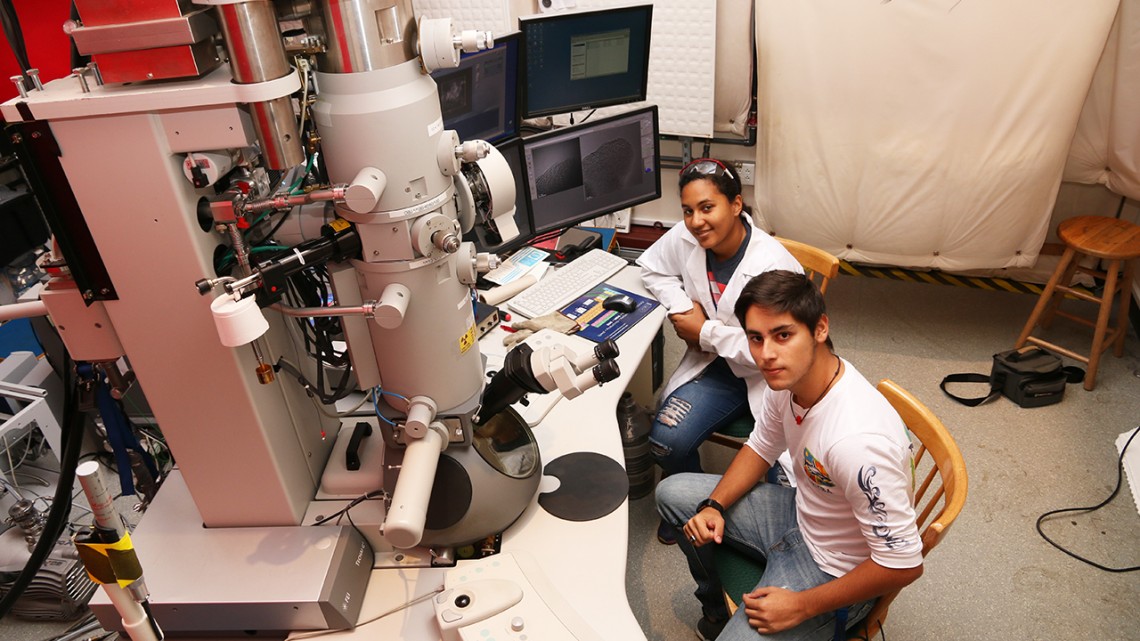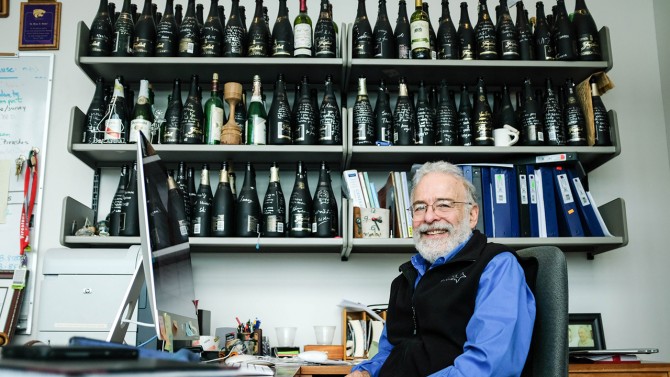
Two student researchers from Puerto Rico work in Hector Abruna’s lab this past summer.
Hispanic-serving institutions partner with CHESS
By Lora K. Hine
Héctor D. Abruña, the Emile M. Chamot Professor in the Department of Chemistry and Chemical Biology, has been working to promote underrepresented minorities in the sciences at Cornell for more than 30 years.
His efforts and hard work are coming to fruition in the form of grant funding from the National Science Foundation, which will help students from his native Puerto Rico access the experimental resources and expertise available to them at the Cornell High Energy Synchrotron Source (CHESS).
The grant, awarded under the NSF Division of Materials Research’s Center for Interfacial Electrochemistry of Energy Materials, was given to principal investigator (PI) Carlos R. Cabrera, Ph.D. ’87, and colleagues from Puerto Rico, and Joel Brock, director of CHESS.
This funding is evidence of the collaboration between CHESS, a cutting-edge research laboratory, and Hispanic-serving institutions in Puerto Rico to promote this educational and innovative collaborative materials research initiative.
The six-year, $3.9 million Partnerships in Research and Education in Materials (PREM) award will provide the support needed to advance the research and education goals of the partnering institutions, which include the University of Puerto Rico, Río Piedras Campus (UPRRP), Universidad Metropolitana and Universidad del Turabo.
Funds will provide interdisciplinary researchers with access to synchrotron X-ray techniques for the study, characterization and enhancement of energy storage and conversion devices. Of equal importance to the NSF, PREM funds will support the training of a diverse and talented community of underrepresented minorities.
“It is tremendously important to provide these opportunities to underrepresented populations,” Abruña said. “Bringing small groups of students to Cornell for research and mentoring is just the right thing to do. Cornell University is a large and prominent institution that can be very intimidating for students, especially for underrepresented minorities. Faculty need to foster an environment where minority students feel comfortable and supported. Our relationships with the faculty from universities in Puerto Rico make this possible.”
Partnerships are the key ingredient of this PREM award, described by Abruña as an evolving “symbiotic” relationship among the participating institutions. Cabrera and co-PI Mitk’El Santiago are both former advisees of Abruña’s: Cabrera was Abruña’s first Ph.D. student; Santiago conducted his postdoctoral research at Cornell a decade ago.
Brock has been a longtime collaborator of Abruña’s and a steadfast ally in the pursuit of equal representation in the sciences.
“An enduring commitment to equity and inclusion is necessary for change to occur,” Brock said. “Relationships between individuals devoted to this cause can move the needle and will impact the demographic landscape of science.”
Abruña and his UPR colleagues started bringing underrepresented minority students to CHESS for research experiences in the 1990s. During this time, Cabrera encouraged Daniel Blasini, an undergraduate student in chemistry at the University of Puerto Rico and member of his laboratory, to continue his education and attend graduate school at Cornell.
In 2000, Blasini became a graduate student of Abruña’s and received his Ph.D. in electrochemistry from Cornell in 2006. Blasini’s research involved using X-ray techniques applied to chemical systems at CHESS. “Blasini was a spectacularly talented graduate student,” Abruña said.
Eleven years later, Blasini’s son, Daniel Blasini-Pérez, came to CHESS from UPRRP for his first summer research experience under the mentorship of Cabrera. The intentional recruiting of students has resulted in a steady, albeit slow, increase in minority students receiving terminal degrees in chemistry across the U.S.
“Deliberate strategies for cultivating a diverse scientific workforce must be enacted,” Brock said. “This is a multigenerational process, not an issue we can solve in one or two grant cycles.”
Abruña, who actively recruits from the universities in Puerto Rico – especially UPRRP – estimates that his research group alone has generated a significant number of the Hispanic students receiving doctorates in chemistry from the top 20 research universities in the United States.
“These students belong here at Cornell,” Abruña said. “When they arrive in my lab, they think I will give them a break because they are from Puerto Rico. Just the opposite: I work them even harder so they never doubt their abilities and their contributions to the field.”
“UPR students and faculty work side by side at CHESS, commissioning beamlines and collaborating with staff scientists,” Brock said. “It is a beneficial arrangement for all stakeholders. The training, advising and mentoring provided to students will contribute to the advancement of scientific initiatives beyond the duration of the PREM award.”
Lora K. Hine is director of CLASSE Outreach Programs.
Media Contact
Get Cornell news delivered right to your inbox.
Subscribe

